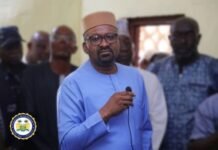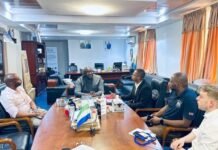By Amin Kef (Ranger)
The 38th Ordinary Session of the African Union (AU) Assembly of Heads of State and Government has successfully adopted the 25th Report of the African Union Committee of Ten (C-10) Heads of State, along with a groundbreaking Decision on the reform of the United Nations Security Council. The report, presented by Sierra Leone’s President, Dr. Julius Maada Bio, who also serves as the Coordinator of the C-10, was unveiled on February 16, 2025 at the AU Headquarters in Addis Ababa.
In his address, President Bio underscored the honor and privilege of leading the efforts to drive the reform agenda of the United Nations Security Council. He expressed confidence that the report reflected the collective determination of African leaders to secure meaningful reforms in the Security Council, emphasizing the importance of promoting the Common African Position (CAP) as outlined in the Ezulwini Consensus and the Sirte Declaration.
The Sierra Leonean President acknowledged the tireless support and collaboration of his fellow African leaders, whose efforts have been instrumental in making substantial progress in the push for a more inclusive Security Council. He emphasized that the CAP is gaining widespread recognition and growing global support, furthering Africa’s path toward achieving enhanced representation on the Council.
“The structure of the UN Security Council is outdated and imbalanced, undermining its legitimacy and effectiveness,” President Bio declared. He pointed out that Africa’s exclusion from the permanent category of the Security Council, alongside its under-representation in the non-permanent category, represents historical injustices that must be addressed.
President Bio highlighted Africa’s significant contributions to global peace and security, noting the continent’s financial support, military personnel and even lives lost in the service of peace. He stressed that these sacrifices should be recognized through enhanced representation in the Security Council.
With a population of over 1.4 billion people, Africa stands as the world’s second-largest and second-most populous continent, making its under-representation in the Security Council increasingly untenable. “Africa deserves a greater voice and presence in both categories of the Security Council,” President Bio asserted, calling on African nations to strengthen their diplomatic engagement with member states, the five permanent members of the Security Council and other key stakeholders to maintain momentum for reform.
The President informed the Assembly of the C-10’s significant strides in advocating for the Common African Position, asserting that the progress made thus far should inspire optimism and hope for future advancements. “We have witnessed unprecedented advancements in the reform process, which should inspire optimism and hope in all of us,” he said.
President Bio presented the 25th Report of the C-10, along with the draft Decision and the annexed Ministerial Outcome, urging the Assembly to adopt the documents and maintain unity throughout the reform process. “Our collective strength is crucial in achieving our goals. Let us speak with one voice,” he appealed.
The report received unanimous support from the Assembly, with several key recommendations reaffirming the Common African Position as the only viable solution to address Africa’s historical injustice. Member states reaffirmed the necessity of treating Africa as a priority in the reform process. President Bio received widespread praise for his exemplary leadership and unwavering commitment to advancing Africa’s interests on the global stage, further solidifying his role as a leading advocate for the continent’s future at the United Nations.
It should be noted that, at a pivotal high-level side event during the 38th African Union Summit, President Dr. Julius Maada Bio urged African leaders and citizens to unite in the pursuit of universal immunization across the continent. The event, titled “Reaffirming Africa’s Commitment to Immunisation: A Call for Action to Strengthen Health Systems,” was held at the Sheraton Hotel on February 16, 2025 in Addis Ababa, Ethiopia.
In his keynote address, President Bio stressed the importance of bold leadership and immediate action to safeguard the health and well-being of African populations. The event reviewed the continent’s progress in immunization, drawing upon the Addis Declaration on Immunisation (ADI), a landmark initiative that has, since its inception in 2017, greatly enhanced vaccine coverage, political support and delivery systems in Africa.
“There is no greater measure of a nation’s progress than the health and well-being of its people. Vaccines are the silent architects of a nation’s strength; they fortify our communities and save lives,” President Bio declared in his opening remarks. He emphasized that universal access to immunization not only safeguards public health but also ensures economic stability, helping African economies remain resilient in the face of health crises.
Reflecting on Sierra Leone’s experiences with health emergencies such as the Ebola outbreak and the COVID-19 pandemic, President Bio underscored the vital role of robust immunization systems in national security. “One of the most important lessons we have learned is that a strong immunization system is not optional; it is fundamental to national security,” he stated.
President Bio also highlighted Sierra Leone’s impressive achievements in immunization under his leadership. By the end of 2024, the country had reached historic vaccination coverage rates, with 95% of children receiving measles vaccinations, 97% coverage for DPT3 vaccinations, and 71% coverage for the newly introduced malaria vaccine.
“Sierra Leone is not just talking; we are leading,” President Bio asserted, noting the country’s commitment to eliminating preventable diseases. “We refuse to accept a status quo where preventable diseases continue to claim lives.”
In a powerful call to action, President Bio urged his fellow African leaders to ensure that every child on the continent has access to life-saving vaccines, regardless of their geographical location. “THIS IS NOT CHARITY; IT IS COMMON SENSE,” he emphasized, stressing the moral and practical imperative of immunization.
In his closing remarks, President Bio appealed to African leaders, international partners, civil society and other stakeholders to take ownership of the continent’s immunization agenda. He warned that Africa cannot rely indefinitely on external funding and must move from a reactive to a proactive stance. “Immunisation must be seen as a non-negotiable pillar of national security because, without a healthy population, nothing else matters,” he stated.
The event concluded with a statement from Dr. Austin Demby, Sierra Leone’s Minister of Health and Sanitation, who spoke on behalf of the African Union Ministers of Health. Dr. Demby reaffirmed the continent’s commitment to advancing the immunization agenda and commended Sierra Leone’s leadership in championing this crucial cause.
President Bio’s call for unity and action serves as a powerful reminder that immunization is not just a public health issue, but a fundamental element in Africa’s future security and prosperity.




